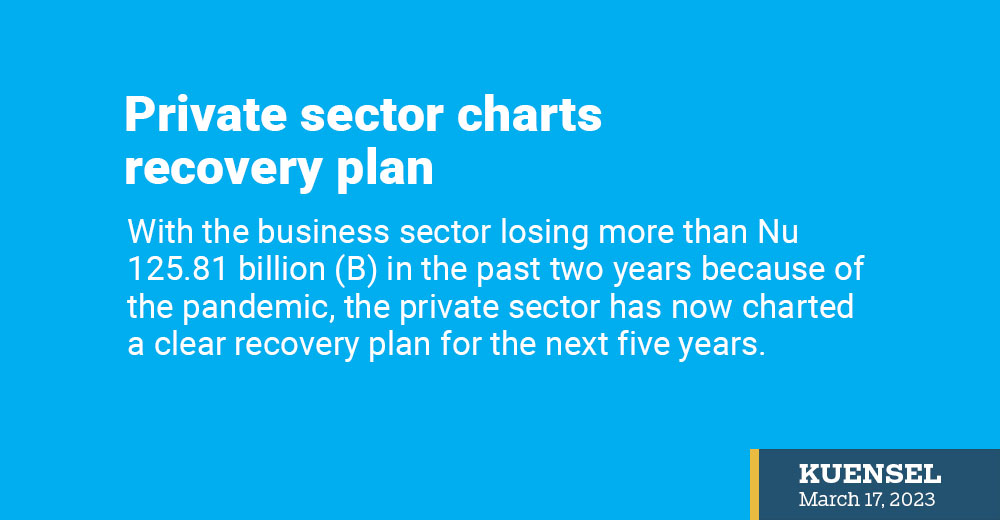Thukten Zangpo
With the business sector losing more than Nu 125.81 billion (B) in the past two years because of the pandemic, the private sector has now charted a clear recovery plan for the next five years.
The Private Sector Recovery Plan (PSRP), which was prepared by the Bhutan Chamber of Commerce and Industry (BCCI), aims at recovery from the devastating impact of Covid-19 and building a stronger, inclusive and diversified private sector with digital technology as its backbone.
The PSPR proposes to achieve five goals–access to fiscal incentives and finances, strengthening local value chains across sectors, use of digital technology, public-private partnerships, and developing a globally recognised human capital.
According to the Plan, the industry sector, which comprises manufacturing and production, electricity and water, and the construction sector, has projected a revenue loss of Nu 48.31B in three years between 2020 to 2023 because of the pandemic.
This is mainly because of weak value chains and dependence on imported labour.
The industry sector’s revenue is projected to reach the pre-pandemic level (2019) of Nu 64.38B by the end of 2022 and to see net growth by the end of 2023.
With pandemic severely affecting the mining and quarrying sector, the revenue loss is projected at Nu 33.74B from 2020 to 2023. The sector would require focused government recovery plans and focus.
Also, the manufacturing and production sector’s revenue is projected to lose Nu 10.98B in the same period, the sector would reach the pre-pandemic revenue at the 2023 end.
The construction sector projected a revenue loss of Nu 18.71B from 2020 to 2023. The sector will not recover to its pre-pandemic health without concerted and immediate interventions, the Plan added.
Trading and services sector’s revenue loss is projected at Nu 47.88B during the period. The sector did not shrink in revenue but saw a growth, but slower than expected.
The revenue loss for the transport, storage and communications sector is projected at Nu 25.25B from 2020 to 2023.
Similarly, the finance, insurance, and real estate sector’s revenue is projected to face a loss of Nu 5.2B from 2020-2023. The sector saw a revenue loss only in 2020, and is projected to see growth from 2021-2023.
The private social and recreational services sector, comprising of the film industry and the karaoke association, is one of the most affected sectors of the economy by the pandemic. From 2020 to 2023, the sector estimated a loss of Nu 1.48B and it would not be able to rebound to its pre-Covid state by the end of 2023.
Mostly affected by the pandemic, the projected loss for the hotel and restaurant sector is Nu 20.51B during the period.
The focused and strategic recovery plan for the sector is critical, requiring a strong dialogue between policymakers and the businesses in this sector, according to the Plan. “If there is no targeted recovery plan in place to support the most impacted sectors as per the revenue projections, the sectors would not recover to its pre-pandemic state even by 2027.”
Recommendations
To save businesses and minimise the impacts from the Covid-19 pandemic, the Chamber proposed access to fiscal incentives and finances.
For this, the Chamber recommended mobilising funds through bank loans, crowdfunding, angel investors and venture capitals, among others.
The BCCI also recommended negotiating with financial institutions to lower interest rates, especially in the construction, mining and quarrying, and wood-based sectors.
It added that there is a need for a waiver of business licence renewal fees for tourism, hotel and restaurant services, private social and recreational services, and manufacturing and production services for a period of three years.
The BCCI also recommended revamping the services to the credit bureau and central registry for moveable assets in promoting access to finance. It added that the small loans could be offered to the private sector to address liquidity constraints and other initiatives such as loans on stock for trading and manufacturing businesses and collateral-free loans in partnership with Royal Monetary Authority’s Kuen-Phen Financing.
For fostering inclusiveness by using digital technologies with every sector, the Chamber proposed the use of e-commerce extensively for trade besides investing in general IT and ITES with strong capabilities to create quality jobs, establishing STEM and ICT services clusters to support other industries via spillovers of technology and productivity.
The recommendation also included collaborating with private financial institutions for efficient payment gateway systems to gain greater market access for tourism and trading.
The Chamber proposed strengthening local value chains across sectors through building networks and market intelligence.
This could be done by collaborating among the sector associations in joint commercialisation, shared use of specialised equipment, and sharing of market intelligence.
BCCI also recommended lobbying for transportation rebates for rural businesses, as well as for exporting businesses that bring in foreign exchanges up to the main port of Kolkata. It further proposed to lobby with the government to stop pricing regulation in areas such as private schools, universities, and wood-based industries and focus on monitoring quality standards, among others.


